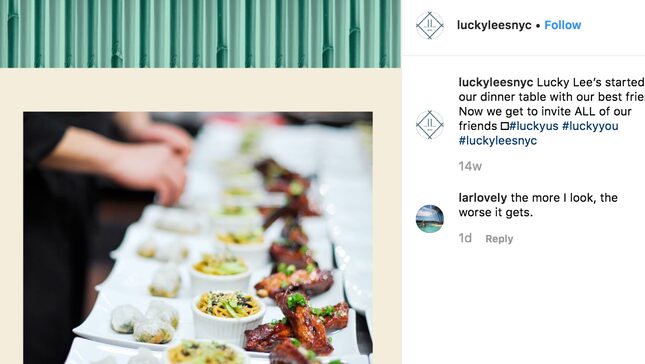Chinese Food Doesn't Need Cleaning
Latest

A recently-opened Manhattan restaurant called Lucky Lee’s is billing itself as “clean,” guilt-free Chinese food by relying on a marketing concept based on a mix of stereotypes and food guilt.
Nutritionist Arielle Haspel recently opened Lucky Lee’s in Union Square, an establishment that sounds, based on a description in The New York Times, more like a place where people who love Instagram but are scared of food can go to take pictures than an actual restaurant:
“Arielle Haspel, a Manhattan health coach with a sleek social media presence, wanted to open the kind of Chinese restaurant, she said, where she and her food-sensitive clients could eat. One where the lo mein wouldn’t make people feel “bloated and icky” the next day, or one where the food wasn’t “too oily” or salty, as she wrote in an Instagram post a few weeks ago.”
She chose a name for her new restaurant, Lucky Lee’s, that sounded stereotypically Chinese, even though she and her husband, Lee, are not Asian. She decorated the restaurant with bamboo and jade touches, and designed her logo with a chopstick-inspired font.”
Of course, Asian-American chefs are not thrilled by the insinuation that there was something wrong with Chinese food to begin with. The idea of Chinese food as “unclean” is a nasty stereotype that has persisted for years, and the idea of a white savior coming in to purify the food has angered chefs who say they were already cooking with organic, non-GMO, and gluten-free ingredients, thank you very much:
“‘Where she is coming from is a very dark place, and it’s a very sensitive place in the hearts of Chinese people,” said Chris Cheung, the owner of East Wind Snack Shop, an acclaimed dumpling restaurant in Brooklyn. Particularly insulting, he said, was the connotation in her marketing that other Chinese food was unhealthy or unclean, which is a stereotype that Chinese restaurateurs have been fighting for decades.”
In much of her promotion for the restaurant, the way Haspel talks about Chinese food sounds as if it’s an enemy that has wronged her. Haspel’s descriptions of Chinese food quoted in the Times include words like “bloated and icky,” “too oily,” “doused in brown sauces.” Which begs the question, why make it at all?
Haspel seems to be cashing in on customers’ insecurities and food guilt then passing it off as catering to people with dietary restrictions, like celiac and nut allergies, a tactic that’s incredibly profitable in the wellness industry. Demonizing something people enjoy—Chinese takeout—while presenting a magical solution that lets customers feel good about eating “bad” food is culturally tone-deaf but also reads like a cynical fad diet cash grab that first makes people scared to eat then presents them with magical “healthy” alternatives.
“I love health-ifying bad food so you can treat yourself, guilt-free,” Haspel says in one of her cooking videos.
Or maybe we could stop feeling guilty in the first place?
Haspel apologized in the Times article:
“We are so sorry,” Ms. Haspel said. “We were never trying to do something against the Chinese community. We thought we were complementing an incredibly important cuisine, in a way that would cater to people that had certain dietary requirements.”
The piece also says the restaurant was busy, and patrons say the food is good. Lucky Lee’s currently has five stars on Google and four and a half on Yelp.